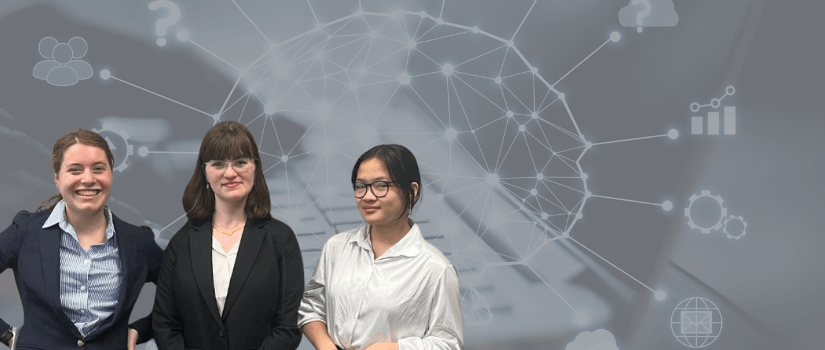A team of University of South Carolina students had to solve an international crisis: technology used to monitor the southern American border had been compromised.
The situation was fictional — part of a competition called Cyber 9/12 Strategy Challenge — but their solution to the problem had to be based on real-world policy dealing with technology that crosses borders.
Hannah Illingworth, a major in cyber policy and ethics at USC, says the challenge gave her a new-found respect for policy makers and the cyber community.
“There are so many external factors my team had to consider that go beyond governance and policy,” Illingworth says.
“We were given an intelligence report in which the simulated event was tracked through news and social media, the dark web, confidential government communications and more. Then, we worked together to produce policy recommendations that we presented to the judges.”
The team made it through two rounds of the competition, which upped the stakes with each stage. As semi-finalists, they had only 12 hours to propose their solutions and worked overnight before presenting to the judges in the morning.
Wilhelmina Cuono, who is also a cyber policy and ethics major, says the experience gave her a better idea of what her future career might be like.
“My dream job would be to work for the FBI in a counterterrorism unit,” she says. “So, the challenge was extremely relevant.”
Cuono initially planned to enroll in a computer science program, but when she learned about USC’s cyber policy and ethics degree, she decided to come to South Carolina.
“The degree was an option that I didn’t see in any other schools I applied to,” she says. “I’m less interested in software development, but more with keeping computer systems safe. I also wanted to focus on the human aspect and keeping people safe.”
As a relatively new degree program in the College of Arts and Sciences, the cyber policy and ethics degree program allows students to combine their interest in technology with the social sciences and liberal arts.
Carl Dahlman, director of the Walker Institute for International and Area Studies, says the name of the program is broad to reflect the global applications of the degree.
“‘Cyber Policy and Ethics’ was a way of doing something really new, teaching students to understand the way in which our online interactions are fundamentally a question of human behavior,” he says. “It can’t be studied in a localized context. It has to be made relevant to broader world affairs.”
The degree offers a range of math and technical courses, interdisciplinary courses in areas like sociology, criminal justice and international policy, plus flexible electives and a foreign language requirement.
In addition, the program offers experiential learning opportunities for students, such as internships for course credit and the Cyber 9/12 Strategy competition.
Chris Becht, a USC alumnus and veteran who worked with the intelligence community for many years, was one of the program’s earliest supporters.
“As a member of the college’s Board of Visitors, this degree caught my attention because these kinds of concerns have been around for decades,” he says. “In the intelligence community, the cyber threat became a prominent concern right after 9/11, when folks in leadership recognized how destructive a cyberattack could be.”
Becht was cheering on USC’s cyber challenge team as they made it to the semi-finals of the competition. This year, the team had to compete virtually, but Becht and his wife, Elizabeth, hope to make it possible for the team to attend in-person next time.
“Traveling to these kinds of events is so important for students because they meet their peers and professionals in the field, and they can learn so much by asking questions about what they do for their careers,” he says.
Both Illingworth and Cuono are planning to compete again next spring. Their goal is to make it all the way to the finals, where they'll have only 15 minutes for the challenge.
“This is very realistic to what they’ll see in their careers,” Becht says. “In a cyberattack, the responding agencies might only have minutes to act.”
No matter how they place, the students say that participating in itself is a big win.
“Learning to face real-world challenges and knowing how to navigate government systems to be heard is such an important part of our degree,” Illingworth says. “The policy side is just as important as our technical skills.”
